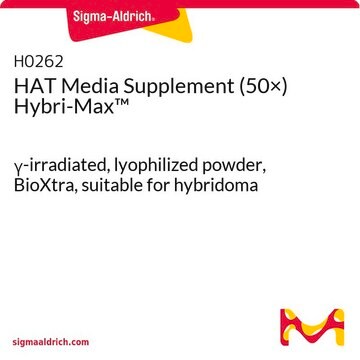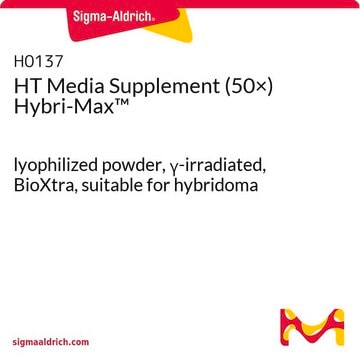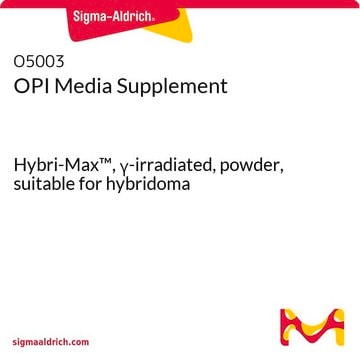11493027001
Roche
IsoStrip™ Mouse Monoclonal Antibody Isotyping Kit
sufficient for 10 tests
Synonym(s):
hybridoma subtyping
Sign Into View Organizational & Contract Pricing
All Photos(3)
About This Item
UNSPSC Code:
23201100
Recommended Products
General description
IsoStrip Mouse Monoclonal Antibody Isotyping Kit is a simple, three-step kit for the rapid characterization of mouse monoclonal antibodies.
Contents
Contents
- Development Tubes, contain lyophilized latex beads, precoated with anti-mouse-Ig antibodies
- Isotyping Strips, precoated with subclass- and light-chain-specific anti-mouse-Ig antibodies
Specificity
Anti-mouse antibodies, bound to the latex beads, will react with any mouse monoclonal antibody regardless of its isotype.Goat anti-mouse antibodies, immobilized to the strip, specifically bind to each of the common mouse antibody isotypes (IgG1, IgG2a, IgG2b, IgG3, IgM, and IgA), and to the light chains.
Specificity for all specific antibodies beside IgML at 1.0 μg/ml: ≥ 2
IgM Lambda, at 1.0 μg/ml: ≥ 1
Specificity for all specific antibodies beside IgML at 1.0 μg/ml: ≥ 2
IgM Lambda, at 1.0 μg/ml: ≥ 1
Application
The kit is used for the rapid identification of class, subclass, and light-chain types of mouse monoclonal antibodies (immunoglobulins).
Features and Benefits
- Reliable: Yields comparable results to the standard ELISA assay
- Fast: 5 minutes from start to finish
- Easy: Only 3 steps
- Economical: No equipment or additional reagents required
- Highly specific: No crossreactivity with FBS
Packaging
1 kit containing 2 components.
Specifications
Assay time: 5 minutes
Sample material: Hybridoma supernatant, purified mouse monoclonal antibodies, ascites
Sample material: Hybridoma supernatant, purified mouse monoclonal antibodies, ascites
Preparation Note
Working solution: Dilute Sample
- Remove the desired number of isotyping strips from the canister. Remove the caps from an equal number of development tubes.
The tubes may be labeled with a pencil or felt-tipped lab marker for easy identification. - Dilute a sample containing the mouse monoclonal antibody in 1% BSA/ phosphate-buffered saline (PBS), pH 7.2 to 7.6.
Culture supernatant samples should be diluted 1:10 to 1:100. Ascites samples should be diluted 1:20,000. These are recommended dilutions and may vary depending on the concentration of antibody in your sample. In our experience, a monoclonal antibody
concentration of 0.1 to 1 g/ml of diluted sample gives the best results. 150 ml of this diluted sample will be added to the development tube.
Other Notes
For life science research only. Not for use in diagnostic procedures.
Legal Information
IsoStrip is a trademark of Roche
Kit Components Only
Product No.
Description
- Development Tubes, containing lyophilized latex beads, precoated with anti-mouse-Ig antibodies
- Isotyping Strips, precoated with subclass- and light-chain-specific anti-mouse-Ig antibodies
Storage Class Code
11 - Combustible Solids
WGK
nwg
Flash Point(F)
does not flash
Flash Point(C)
does not flash
Certificates of Analysis (COA)
Search for Certificates of Analysis (COA) by entering the products Lot/Batch Number. Lot and Batch Numbers can be found on a product’s label following the words ‘Lot’ or ‘Batch’.
Already Own This Product?
Find documentation for the products that you have recently purchased in the Document Library.
Customers Also Viewed
Wioleta M Zelek et al.
Frontiers in immunology, 11, 612402-612402 (2021-01-12)
Better understanding of roles of complement in pathology has fuelled an explosion of interest in complement-targeted therapeutics. The C5-blocking monoclonal antibody (mAb) eculizumab, the first of the new wave of complement blocking drugs, was FDA approved for treatment of Paroxysmal
V Lascano et al.
Oncogenesis, 4, e136-e136 (2015-01-27)
We have previously shown that the tumor necrosis factor family member a proliferation-inducing ligand (APRIL) enhances intestinal tumor growth in various preclinical tumor models. Here, we have investigated whether APRIL serum levels at time of surgery predict survival in a
Tessa Grabinski et al.
Frontiers in molecular neuroscience, 9, 123-123 (2016-12-03)
Glycogen synthase kinase 3 (GSK3) β and α are serine/threonine kinases involved in many biological processes. A primary mechanism of GSK3 activity regulation is phosphorylation of N-terminal serine (S) residues (S9 in GSK3β, S21 in GSK3α). Phosphorylation is inhibitory to
Shirley Lam et al.
mAbs, 7(6), 1178-1194 (2015-08-26)
Chikungunya virus (CHIKV) is a medically important human viral pathogen that causes Chikungunya fever accompanied with debilitating and persistent joint pain. Host-elicited or passively-transferred monoclonal antibodies (mAb) are essential mediators of CHIKV clearance. Therefore, this study aimed to generate and
Julie A Webster et al.
Cancers, 13(12) (2021-07-03)
The current endoscopy and biopsy diagnosis of esophageal adenocarcinoma (EAC) and its premalignant condition Barrett's esophagus (BE) is not cost-effective. To enable EAC screening and patient triaging for endoscopy, we developed a microfluidic lectin immunoassay, the EndoScreen Chip, which allows
Our team of scientists has experience in all areas of research including Life Science, Material Science, Chemical Synthesis, Chromatography, Analytical and many others.
Contact Technical Service










